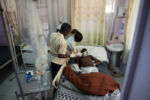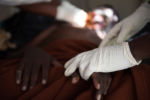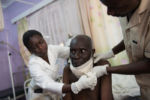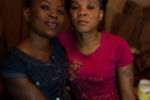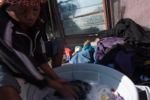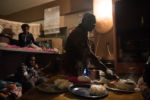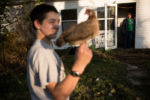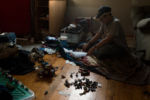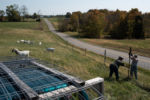1st. Nicholas Pfosi / Tufts University
Summary: Samwell Mosota Omaiyo sits up in his bed on Sunday afternoon at the Texas cancer center in patient facility in Nairobi, Kenya on Sunday, Aug. 23, 2015. He was recently diagnosed with late-stage mandible cancer and is extremely sick. The nurses who take care of him here at the center are trained in palliative care and tend to over a dozen other patients around the clock in this small medical building the outskirts of the city.
Due to a lack of diagnostic technology and a stigma around cancer in kenya patients like Samwell often aren’t diagnosed until their illnesses become terminal.
Here at the center, all the nurses have received specialized training in palliative care and work exclusively with patients who have life-limiting illness. Part of what separates palliative care from other forms of patient care is the holistic approach to treatment. This includes caring for the patient’s emotional and psychological wellbeing as well as their physical needs.
On Wednesday, Aug. 26, 2015, Samwell Mosota Omaiyo passed away due to organ failure early in the evening. He died peacefully.
A palliative care nurse Carren Asembo, attended to him in his final moments and when his wife called to see how her husband was improving after a particularly lucid visit earlier that day, she had the responsibility of informing his wife of Samwell’s death. When asked about how she felt following his loss she said, “Nursing is not a job, it’s a calling. Those who can’t adjust and handle caring for others come, but they soon leave.”
2nd. Nicholas Pfosi / Tufts University
Summary: In 2000 Sheila Kadende moved from Zimbabwe to Johannesburg, South Africa. In 2006 her landlord suddenly evicted her and every other resident of their building in Johannesburg’s Central Business District to make way for new construction: a mall. Kadende is a victim of the city government’s efforts to “rejuvenate” low-income areas with shopping centers and small businesses – an effort commonly known as gentrification. Since her eviction, Kadende, 42, her eight year old daughter Madeleine and her twenty year old nephew Washington have lived in a desperate housing situation, provided by the government that theoretically treats accommodation as a human right but practically is overwhelmed by systemic poverty.
3rd. Nicholas Pfosi / Tufts University
Summary: Each morning, Amy Keach milks her dairy goats with the help of her younger son, Andrew. Over the past half decade, the Keach family has expanded their herd to more than 30 animals. Every day, the goats, which Amy often brings to shows and competitions, produce two gallons of milk.
In the rolling hills outside of Frankfort, the goats graze on a small plot of land in Bagdad, Kentucky along the border of Shelbyville and Franklin county. Amy’s husband, Nathan, is serving abroad for the National Guard in Kuwait.
Amy, who grew up in Los Angeles, says she never foresaw owning goats. Her city-bound parents did pay for horseback-riding lessons for her though and unwittingly fostered her love for the countryside. At the age of 17, Amy moved across the country to Kentucky, exiting her Southern California life forever. “I like not having my neighbor two feet from me,” she says. “Once I moved out of L.A., there was no going back.”
HM. Alexandra Wimley / Boston University
Summary: Beyond the Podium: Primaries 2016

